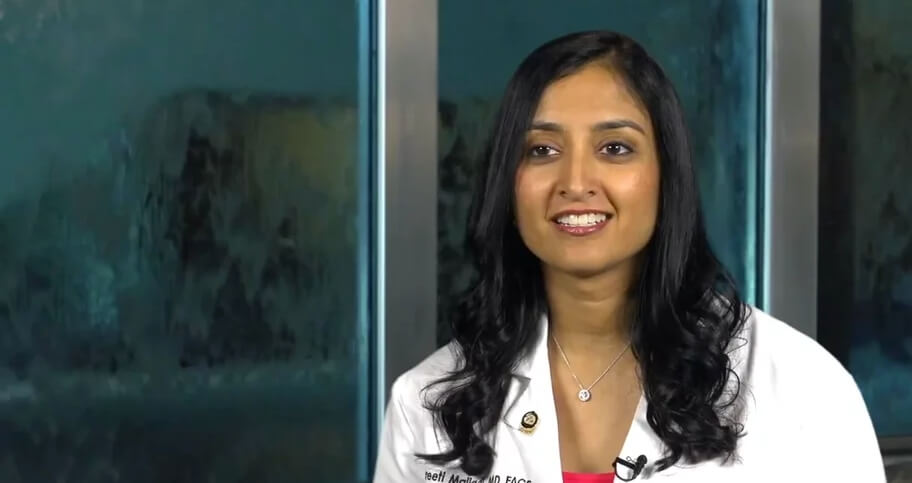Gastroesophageal Reflux Disease
Gastroesophageal Reflux Disease (GERD) is a condition in which stomach acid regularly spills up into the esophagus. Commonly known as acid reflux, it is a chronic, often progressive disease.
GERD is caused by a weak lower esophageal sphincter (LES) that allows acid and bile to reflux, or flow back, from the stomach into the esophagus. The (LES) is a muscle around the base of your esophagus that opens to let food through. The LES acts like a valve, allowing food and liquid to pass through to the stomach and functions as the body’s natural barrier to reflux. Normally, the LES resists opening to gastric pressures to prevent reflux. When it fails to close completely, the gastrointestinal condition known as GERD can occur.
Schedule An Appointment
In people with GERD, the LES is weak and allows acid and bile to reflux from the stomach into the esophagus, often causing injury to the lining of the esophagus and symptoms such as heartburn, chest pain, regurgitation, sore throat, and cough.
This condition can lead to other issues, including inflammation, ulcers, bleeding, esophageal narrowing, or precancerous changes.
An estimated 1 in 5 U.S. adults suffer from GERD. GERD can be debilitating, causing daily pain, leading to poor sleep, affecting food tolerance and limiting daily activities. When left untreated, GERD can lead to potentially serious complications including esophagitis (inflammation of the esophagus), stricture (narrowing/scarring of the esophagus), and Barrett’s esophagus (precancerous changes to the esophagus). The incidence of esophageal adenocarcinoma, a type of cancer linked to GERD, increased over 600% between 1973 and 2006.
Medications for GERD are designed to control or suppress acid production in the stomach. They DO NOT address the cause of GERD and cannot prevent reflux. Approximately 40% of GERD sufferers continue to have symptoms while taking medications for GERD.
According to the FDA, long-term use of PPIs, a class of GERD medication, may have adverse effects including: osteoporotic fracture risk, Clostridium difficile infection, low magnesium levels, and increase in cardiac arrhythmias.

GERD – Symptoms and Risk Factors
GERD is most often manifest by heartburn—a burning sensation in the chest that may travel upward through the throat. Other symptoms include:
- Dysphagia, or difficulty swallowing
- Hoarseness
- Sore throat
- Chest pain
- Vomiting up food
- Dry cough
- Feeling a lump in your throat
If you have chronic heartburn or experience any of these other symptoms regularly, you likely have GERD. Various risk factors may lead to acid reflux, including obesity, diabetes, hiatal hernia, smoking, pregnancy, dry mouth, asthma, or delayed gastric emptying. Many of these tend to result in extra pressure being placed on stomach contents, forcing them up through the lower esophageal sphincter (LES) and into the throat.

Traditional Treatments
Treatment is often handled with medications and diet changes that control acid reflux. They may be as simple as antacids to neutralize acid or drastic as meds that completely block stomach acid production. Others are designed to strengthen the LES.
The problem with medications is they often do not work. About 4 out of every 10 people who take medications for GERD still experience symptoms, and many medications have negative side effects, including increased risk of bone fracture and abnormal magnesium levels.
More invasive treatments like surgery can have a much more reliable result for patients with chronic heart burn and acid reflux. Surgical procedures depend on what’s causing your GERD in the first place. For example, laparoscopic hernia repair can be used to fix a hiatal hernia causing reflux.
The LINX System
One minimally invasive surgery that can be used to strengthen a weakened LES is the LINX System. This system uses a ring of magnets that are placed around the LES. The magnets, which are enclosed in titanium beads and connected by titanium wire, cause the ring to constrict a little, assisting closure of the LES. It applies just enough pressure to prevent acid reflux, but not so much that it inhibits swallowing.
Surgical procedures are generally reserved for those who have chronic GERD symptoms and who have already tried other treatments without success. To learn more about GERD and find out whether you qualify for LINX or other minimally invasive treatments, contact Dr. Malladi’s office today.

